Honduras: Noé Cabrera, a lasting commitment

Noè Cabrera: Allied with the Colonia Nueva Suyapa, Tegucigalpa, Honduras.
In 1991, I got to know ATD Fourth World through volunteers who lived in my neighborhood. The way that they behaved with the children and families that they met caught my attention. They greeted and treated everyone as equals, and did so with humility and trust. They were always going to meet the young people, not simply to make friends, but to discover the commitment that the youth of the neighborhood had towards their own community. They wanted to reach those who suffer the most. From them I have drawn strength to reinforce my own commitment over the years.
They had a charisma of joy, which helps young people to engage. At first, my only commitment was to facilitate the Street Libraries, and through that I learned that ATD was an international organisation, present in many countries.
With ATD Fourth World, I discovered Fr. Joseph Wresinski, the founder of the movement. His life was an example of struggle; a life that wasn´t easy, like mine; he strived since childhood to succeed and help his family.
A phrase from Father Joseph has always stayed with me: “The poorest people are our teachers.” It is true; when I go to visit families, every day I learn from their struggles and their joys. This experience becomes something shared, because they can also learn from us.
I really enjoy spending time with children. We were going to neighborhoods like La Bolsa (El Rio), Los Pinos, Flores de Oriente, and little by little I began caring more deely for the all of the things that we were doing. Everybody greeted me with a hug, or a handshake. That makes the trust and affection apparent–it isn’t only an activity with books that we’re doing. A personal relationship is born. After you create this relationship, your commitment grows and is maintained throughout the years.
So I began to visit families in addition to facilitaing the Street Library. Over time we became friends by talking to each other about our experiences. The families of Fourth World are people who struggle daily to survive, but nobody sees their efforts, no one recognizes them. Doña Rose rises with the sun to make tortillas and sell them to make a better life for her children. Doña Doris pulls the sand out of the river herself to sell it, and collects scrap… People may think that these are small jobs, but they are tough to do. All their efforts are to make a decent life for their family.
Many people say “those river people” with contempt, without knowing everything they do to keep going. It is them, the families living on the river bank who find the courage to rebuild every time a flood makes them homeless. I always wonder where they get the strength? And despite all of the difficult things that they experience, they are always willing to welcome us in their homes.
One of the hardest parts of this commitment is when families lose their children to violence. When a mother loses her child it is difficult to find words of condolence. I can only stay by her side to be with her. In moments like that, I can’t find the words, and I just suffer with them. But I do know that a hug and a visit mean a lot to them. Through my presence, they are part of a whole movement of people who reject the misery of poverty, who are on their side, and who find violence unbearable.
For me, I feel lucky to know ATD Fourth World. If it did not have a presence in Honduras I wouldn’t know the families I know today. From them, I learn to fight every day, just as they do to make a better life for their children. It gives me the strength to keep going when there are difficult things in my life. To change hardship into the struggle to create joy in our lives is what I have learned from these men, women, and children who live in situations of extreme poverty.
I feel great respect, thanks to this movement that allowed me to meet people I did not know.

